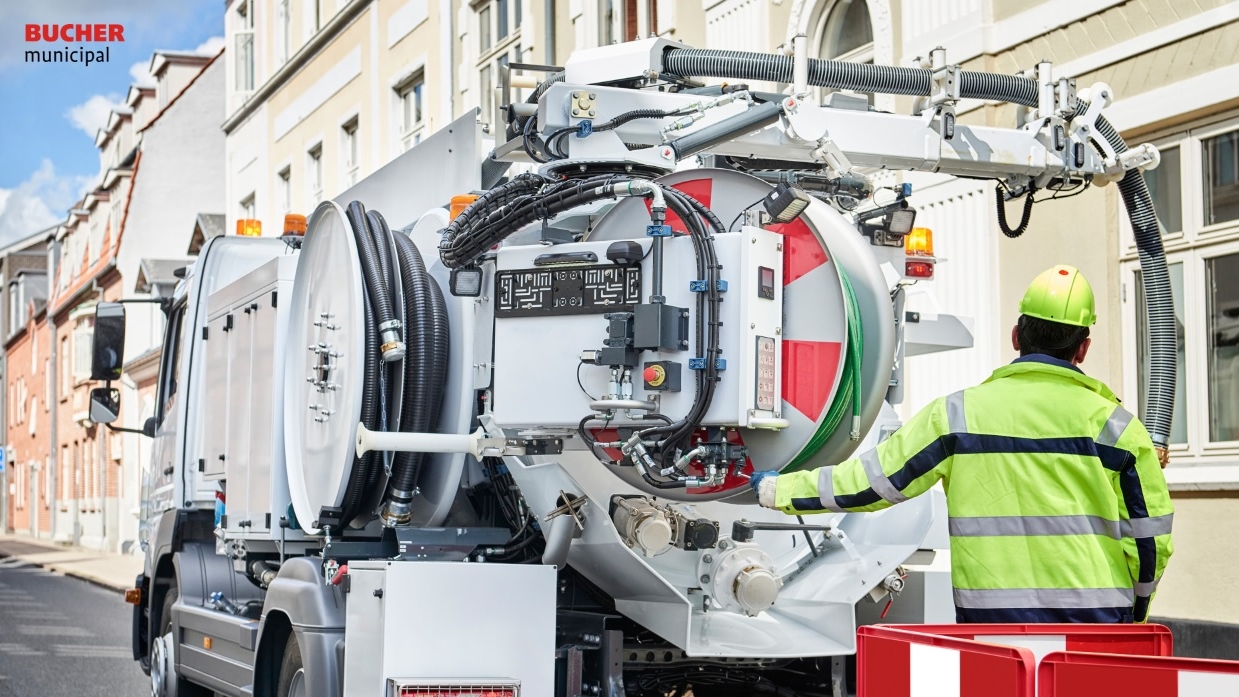London has witnessed many changes recently, with the Ultra Low Emission Zone expanding, the new Direct Vision Standard, and an update to the Highway Code, a lot has happened that could affect drivers. However, if you are operating a Bucher Municipal sewer cleaner these rules may not apply…
The Direct Vision Standard announced in 2021 means a HGV vehicle must meet at least a 1 out of 5 star safety requirement in order to be permitted within London, and going forward into 2024, 3 stars will be required in order to avoid a fine. These safety features focus on how much vision the driver has of the road, cyclists and pedestrians while inside the cab. If your vehicle does not meet the requirement, measures can be implemented in order to improve this field of vision. These include camera monitoring systems, sensor systems, driver alerts, and class V/VI mirrors.
This change is significant as in 2013 alone, HGV’s were involved in over 60% of incidents leading to cyclist fatalities in London. HGV’s make up only 2% of the vehicles on the road across Europe but are involved in 15% of fatal road collisions.
Sewer cleaners however are exempt from this new law. Being stationary while working and the necessity of sewer cleaners in cities means any sewer cleaner operating within these borders do not need to make these direct vision changes and will not incur a fine. They do still need to apply for a permit through the TFL website, but this is free and a very quick process.
As of the end of January this year, new Highway Code regulations were set in place to protect more vulnerable road users. All road users must follow these new laws. The change with the most impact on HGVs is the new road user hierarchy; the vehicle (or user) that could cause more damage in a collision, takes more responsibility. Another being pedestrians are given more right of way at junctions and crossings – with those waiting to cross having the right of way over vehicles turning into or out of those roads.
October 2021 saw the Ultra Low Emission Zone for London widen. Now, vehicles that do not comply with the new standards will receive fines of £12.50 a day.
The ULEZ was introduced as a way to improve air quality and health of those in the capital. Air quality is measured by analysing the concentration of certain pollutants in the air including Inhalable Particular Matter (PM10 and PM2.5). The main source of PM emissions is from internal combustion engines and dust. These settle on surfaces, then when driven over, the gusts produced from that movement cause the particulates to become airborne, mixing with the air and lowering the air quality. Consequently, exposure to PM10 and PM2.5 has been shown to have a detriment to lung and heart health and an increase in respiratory diseases such as asthma.
One study (Kumari Et al., 2020) showed that the significant reduction in air pollution during lockdown was due to lower levels of PM2.5, PM10 and NO2. This improvement in air quality was global, however it was proven to be temporary – once lockdown restrictions lifted, the pollution levels once again increased.
London is combating the air quality crisis by reducing the number of particulate-producing vehicles driving through the city… And it’s working.
In an evaluation by the Greater London Authority, they found that although there was a “substantial and immediate improvement in air quality in recent years, significant work remains to bring London’s pollution down to levels where it does not have a harmful impact on public health.”
Similar to the Direct Vision Standard, sewer cleaners are also exempt from the ULEZ. Again, a permit is required for the exemption but this is also free.
London is leading the way in low emission and safety standards, changing rapidly for the better. For the time being though, the regulations are being introduced in a measured way with sewer cleaners being one of the exceptions to the rule.



